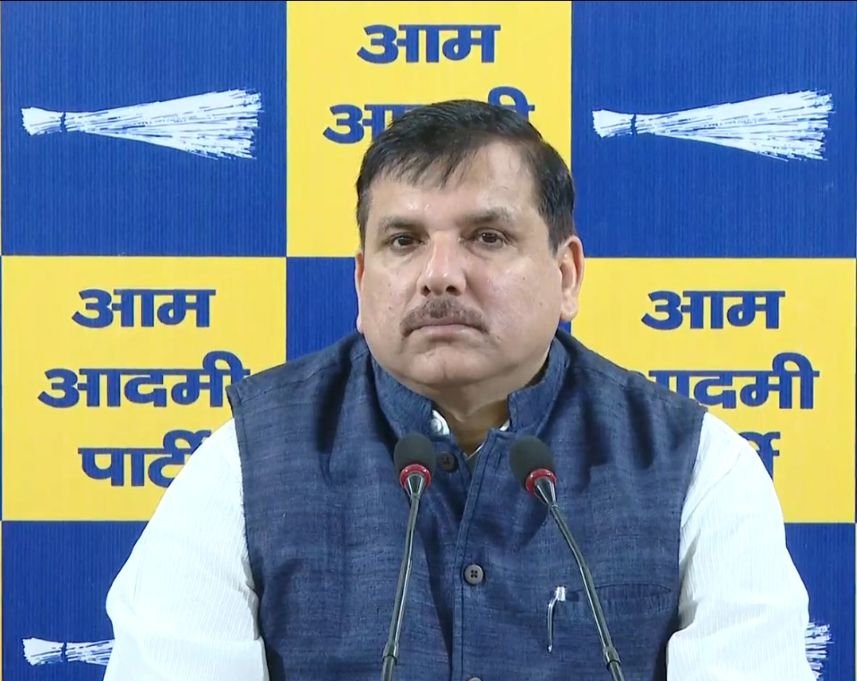In a fresh face-off between the Aam Aadmi Party (AAP) and the ruling Bharatiya Janata Party (BJP), a team from the Central Bureau of Investigation (CBI) carried out a raid at the residence of senior AAP leader and Gujarat co-in-charge Durgesh Pathak. The development, which surfaced early through a social media post by Rajya Sabha MP and AAP stalwart Sanjay Singh, has sparked a political firestorm with AAP leaders alleging a targeted campaign by the central government to crush the opposition’s growing influence.
The raid, according to CBI sources, is linked to suspected irregularities in foreign funding, potentially in violation of the Foreign Contribution Regulation Act (FCRA). While the investigation agency has not made an official public statement yet, sources confirm that the search operations are part of a broader probe into financial dealings within the party’s organizational framework. The move comes at a time when Durgesh Pathak has been at the forefront of AAP’s expansion strategy, particularly in Gujarat—a state traditionally seen as a BJP stronghold.
Reacting sharply to the raid, AAP leaders have called it a politically motivated act orchestrated by the BJP to instill fear and disrupt the party’s growing momentum ahead of crucial electoral battles. Sanjay Singh, addressing the media in a press conference, accused the Modi government of weaponizing central agencies to target opposition voices. He claimed that the raid on Pathak’s residence was not about financial scrutiny but about derailing the party’s organization-building efforts in Gujarat.
He described the move as “Modi government’s dirty game,” alleging that similar tactics were previously used to jail senior AAP leaders, including Delhi Chief Minister Arvind Kejriwal. Yet, despite such setbacks, Singh affirmed that AAP would not bow down and would continue its political fight against the BJP with even greater resolve. He emphasized that the timing of the CBI action—coinciding with Pathak’s strategic responsibilities in Gujarat—indicates that the ruling party is feeling the pressure in a state it once considered its political fortress.
AAP has maintained that the raid is an extension of a pattern where investigative agencies like the CBI, Enforcement Directorate (ED), and Income Tax Department are increasingly used as tools of political retaliation. The party argues that such actions are less about governance and accountability, and more about consolidating political dominance by stifling emerging alternatives.
Party convener Arvind Kejriwal, along with several other AAP leaders, took to social media platform X to condemn the CBI action. They called it part of a broader conspiracy to dismantle AAP by targeting its leadership under the guise of legal investigations. Kejriwal’s post claimed that these methods are being deployed because the BJP fears losing electoral ground in Gujarat, where AAP has been gaining traction among voters disillusioned by the status quo.
Observers see this incident as part of an increasingly aggressive political landscape in India, where the lines between legal process and political strategy appear blurred. The use of central agencies against opposition leaders raises critical questions about democratic norms, institutional independence, and the health of political competition in the world’s largest democracy.
Durgesh Pathak, widely recognized as one of AAP’s key strategists, has been instrumental in the party’s grassroots mobilization in Gujarat, aiming to replicate the Delhi model of governance and outreach. His rising prominence may have drawn the attention of not just voters, but also political rivals seeking to halt AAP’s expansionist ambitions. While the investigation continues, the political messaging around it is unmistakable—AAP views this as an act of intimidation rather than a neutral legal inquiry.
As the raid unfolds, it becomes yet another flashpoint in the growing rift between the BJP-led central government and the opposition parties. With the 2024 general elections behind and state polls ahead, such confrontations are likely to intensify. But in this battle of perception and power, the deeper concern remains whether the country’s democratic institutions can withstand the mounting pressure of politicization. For now, the raid on Durgesh Pathak’s home marks another chapter in India’s contentious political narrative—where electoral competition increasingly plays out in courtrooms and agency offices rather than just on the ballot box.
#CBIRaid #DurgeshPathak #AAPvsBJP #FCRAProbe #PoliticalVendetta #IndianPolitics #DemocracyUnderThreat
